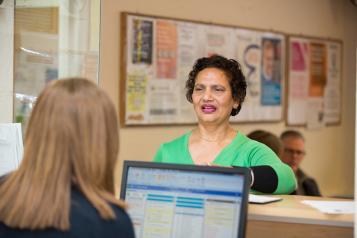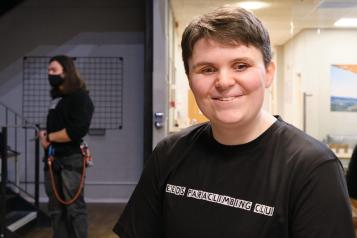Your Care, Your Way: healthcare information that works for you
We're supporting Healthwatch England's Your Care, Your Way campaign on accessible information for patients.
Introduction
Clear, understandable information is important to help you make decisions about your health and care and get the most out of services. With fewer NHS appointments taking place face-to-face and more people managing their conditions while waiting for treatment, clear information that you can understand and act on is more important than ever.
Since 2016, the Accessible Information Standard has given disabled people and people with a sensory loss the legal right to get health and social care information they can understand and communications support if they need it. But, is the standard being delivered by services and does it go far enough? We want to help NHS and social care services understand the answer and make sure health information is clear for everyone, no matter what their needs.
The national Healthwatch England campaign ‘Your Care, Your Way’ aims to:
- Find out how well health and care services are delivering the Accessible Information Standard
- Make sure that, if the standard covers you, you know your rights
- Find out who else has problems understanding information about their healthcare and needs to be covered by the standard.
Why is clear information so important?
We all expect to be involved in decisions about our health, treatment and support.
But medical and healthcare information can be complex, and if you don’t get clear and understandable information, you might not make decisions that are right for you.
Do you understand what your treatment or support involves? Do you know the risks and benefits? Are there any alternatives? Do you know what might happen if you don’t follow the advice of doctors, nurses and other care staff?
You can only answer these questions and make choices that suit your needs if you get information in a way you can understand.
Some people find getting clear and understandable information even harder because they have communication needs that require support. For example, they might need an interpreter or information in format like Braille.
What rights do you have?
In 2016, the Government introduced the Accessible Information Standard.
If you have a disability, impairment or sensory loss, or are a parent or carer of someone who does, the standard gives you the right to be given information in way you can understand.
Health and care services should:
- Ask if you have any communication needs and how they can meet them.
- Record your needs and highlight them in your file or notes, so staff are aware and know how to meet them.
- Share information about your communication needs with other care services when you give your permission.
- Deliver information in a way you can access and understand, with the option for communication support if you need it.
You should expect
- To contact and be contacted by services in ways you find accessible, for example, via text message.
- Services to give information and correspondence in formats you can read and understand, such as audio, braille, easy read or large print.
- To be supported at appointments if needed, for example, by a British Sign Language interpreter being provided.
- Health and care services to support you to communicate, for example, enabling you to use a hearing aid.
I am deaf and communicate in BSL. I need BSL interpreters for all health appointments. I have multiple health problems and [they] know I need interpreters. Many times, I arrive for appointments and no interpreters are booked. I had PET-CT scan… and no interpreter had been booked. I contacted a friend by text to ask for help. I always suffer more stress and anxiety because of my basic communication needs are not met.
Are people getting the information they can understand?
We reviewed the stories that 6,200 people shared with us between April 2019 and September 2021 to determine how well the NHS is delivering the Accessible Information Standard.
While some people experience good communications support from services, we found that many more are not.
Problems accessing and using services
People told us about the obstacles that made it hard to access care and use services, leaving them frustrated, concerned about their health and reliant on others.
Needs overlooked: When services are designed, people’s communication needs are often overlooked. We heard stories that ranged from blind people being given order forms for a white cane in an inaccessible format, to GP surgeries that expect people with hearing loss to book appointments over the phone.
Support not in place: Some services are not putting basic support in place or are unwilling to provide the help people are entitled to. Examples include dental practices not getting hearing induction loops installed or GPs refusing people access to a sign language interpreter.
Inconsistent service: People said that even when services recorded their communications needs, the support was not provided. Experiences included missed appointments because services had sent letters in an inaccessible format, interpreters not turning up for meetings or doctors not knowing that they needed to take more time to explain an issue clearly.
The burden on patients and families: When information is not in the correct format or support is unavailable at appointments, individuals often rely on family, friends or carers to translate information. People told us this makes them feel less independent, less in control of decisions and forced to share sensitive health information. We also heard stories of families who had lost income because they had to take time off work.
I feel like the doctors in the surgery don’t even listen to me and they don’t even give me the time I need to explain my issues with my health. I struggle with understanding and need more time because I have a learning disability and my health is a bit more difficult because of this.
Not enough awareness
A lack of awareness about what patients should expect can often cause the issues people tell us about.
Staff support and training: Doctors, nurses and care staff should get training to understand people’s communication needs. But this awareness is often missing in day-to-day interactions. A blind person told us that a staff member called out their name for an appointment and then walked away expecting them to be able to follow. While D/deaf patients experienced staff, who tried to communicate with them by shouting.
Information about rights: People told Healthwatch that they were uncertain about what they should expect when it came to their rights under the Accessible Information Standard or where to go for information. This uncertainty makes it harder for individuals to ask for the support they are entitled to.
The impact of COVID-19
The pandemic led to additional problems for people:
- Not being able to understand Government advice and rule changes because the information was not in the correct format
- No longer getting information from the NHS in the formats they needed
- Unable to lipread what staff are saying because of the widespread use of face masks
- Unable to rely on family or friends to translate at appointments because of limits on the number of people who can attend.
Are services addressing accessibility problems?
We asked the NHS questions to understand how well they are meeting the Accessible Information Standard.
139 NHS organisations responded, and we found that only a third (35%) fully meet the standard.
Problems we found:
- Only 53% of NHS services said they ask patients about their accessible information needs when they first contact them.
- 24% of NHS services said that they do not record people’s communication needs on their patient file or only do this some of the time.
- When patients give consent for their communication needs to be shared with other health and care services, only 57% of NHS services said they routinely do this.
- Only 36% of NHS organisations had undertaken work in the last three years to find out if they’re meeting the Accessible Information Standard.
How can we fix the issue?
Our campaign is asking Government and services to take five steps that will make sure that more people with a disability, impairment or sensory loss are given information in the way they can understand.
We are calling for:
- Health and care services to be made more accountable for delivering the standard.
- Every health and care service to have an accessibility champion.
- Better IT systems so you can tell services your support needs.
- People with communication needs to be involved in designing better services.
- Compulsory accessibility training for NHS staff.
Should you have a right to accessible information?
Some people think the legal rights provided by the Accessible Information Standard should cover more people.
For example:
- If your first language is not English, have you had problems getting health and care information translated?
- With one in ten of us estimated to have dyslexia, would some people benefit from a more dyslexia-friendly NHS?
But to help NHS England answer this question, we need more evidence. That is why we are calling on people to tell us their experience of being given or told health and care information, whether it is good or bad.
Downloads
Information about our campaign is available in Easy Read.
Get involved in our campaign
Whether you use or work for health and care services, you can play your part in helping to ensure people are given healthcare information in the way they need it.
You can sign-up for our campaign, find out more about the rights people currently have or share your story to help services understand how information can be made more accessible in the future.


